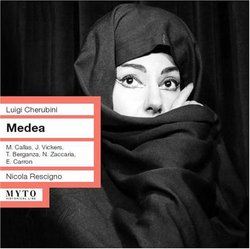| All Artists: Luigi Cherubini, Nicola Rescigno, Dallas Civic Opera Orchestra, Elisabeth Carron, Jon Vickers, Judith Raskin, Maria Callas, Mary MacKenzie, Nicola Zaccaria, Peter Binder, Teresa Berganza Title: Luigi Cherubini: Medea Members Wishing: 1 Total Copies: 0 Label: Myto Records Italy Original Release Date: 1/1/2008 Re-Release Date: 11/25/2008 Album Type: Import Genre: Classical Styles: Opera & Classical Vocal, Historical Periods, Classical (c.1770-1830), Modern, 20th, & 21st Century Number of Discs: 2 SwapaCD Credits: 2 UPCs: 675754011765, 8014399501644 |
Search - Luigi Cherubini, Nicola Rescigno, Dallas Civic Opera Orchestra :: Luigi Cherubini: Medea
 | Luigi Cherubini, Nicola Rescigno, Dallas Civic Opera Orchestra Luigi Cherubini: Medea Genre: Classical
|
Larger Image |
CD Details |
CD ReviewsCALLAS' GREATEST MEDEA L. Mitnick | Chicago, Illinois United States | 05/24/2010 (5 out of 5 stars) "This performance is so famous that it hardly merits a detailed review, since veteran opera fans (as well as Callas fanatics) probably already own it. It seems highly unlikely that this opera will ever find as secure a place in the operatic repertoire as it did during Callas' time ---- simply because Callas was the only performer equipped with the resources to perform the role of Medea. Other sopranos, such as Rysanek, Caballe' and Gwenyth Jones attempted it, but failed completely. Prior to Callas, the opera had not been performed in close to fifty years. But all that aside, Callas WAS Medea, and her Greek roots undoubtedly aided her in creating the legendary fire-eating dragon who murders her own children to get even with her husband for abandoning her for a younger woman (whom Medea also murders!). The role is a vocal and histrionic killer, and Callas filled the role to the point of overflow. Never have I heard a voice able to express such loathing, hatred, and poison as Callas' savage Medea. Medea does not make her entrance until more than half of Act I is over, but from then on, she's singing relentlessly. This is clearly no opera for any contemporary soprano today.
This Dallas Medea took place on November 6, 1958. Within hours before, Callas was fired from the Metropolitan Opera by Rudolph Bing for refusing to alternate Violetta in "Traviata" with Verdi's Lady Macbeth. And of course, with Callas being Callas, she called a press conference in which she delivered a angry denouncement of Bing. One can almost "feel" this anger in her performance. The lower chest notes are drenched in poison and evil, yet the top notes are lashed out with complete vocal security. Truly, this may have been the greatest operatic performance of Callas' career (though one could make an equal case for her Traviata at Covent Garden in 1958, or her Anna Bolena or Norma at La Scala). Callas was also lucky to have a great collaborator in Jon Vickers, whose Jason is a perfect foil for her. Teresa Berganza, then at the very outset of her career, is a young and opulent Neris, Medea's maid, and as King Creon, Nicola Zaccaria displays a sonorous bass voice. The only weak link is the soprano Elisabeth Caron, whose Glauce (Jason's doomed bride) is weak-voiced and rather ineffective in her aria that conveys her fear of Medea. The role, however, is very small, and by the time Medea makes her entrance, she is not heard again. Nicola Rescigno, who was Callas' very frequent collaborator in both live and studio performances over a ten year period, ignites the orchestra into a frenzy when he must, and of course he and Callas feed off of each other. The results are a revelation. The sound of this Myto pressing is, to my ears, superior to any I've heard of this performance. No - it's not perfect, but it's perfectly listenable. Also, this being a live performance, there are a few times when Callas is "off mike" and sounds a little distant. No matter ----- this is a performance that must be experienced to be believed, and of equal importance, it's an essential document for anyone interested in knowing why Maria Callas is to this day considered to be the most unbelievable operatic artist of the Twentieth Century. It cannot be passed over." |

 Track Listings (16) - Disc #1
Track Listings (16) - Disc #1